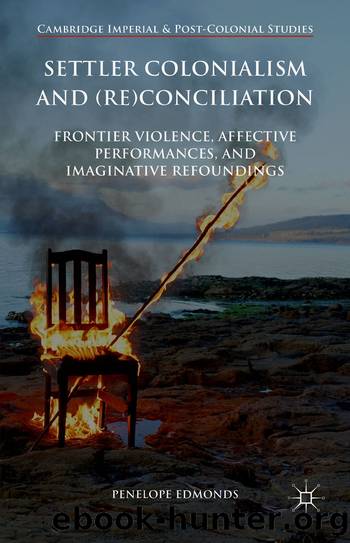Settler Colonialism and (Re)conciliation: Frontier Violence, Affective Performances, and Imaginative Refoundings by Penelope Edmonds

Author:Penelope Edmonds [Edmonds, Penelope]
Language: eng
Format: epub
Publisher: Palgrave Macmillan
The politics of refusal: Sorry Days, anger and compulsory compassion
Sorry Day at Risdon Cove in Hobart in 2001 was one expression of public reconciliation in Tasmania organized to coincide with National Sorry Day. It occurred during a period in the life of the nation when many Aboriginal and non-Aboriginal people in Australia urgently desired to hear the word ‘sorry’ publicly declared. Across the country, people wanted a full and formal apology by the Prime Minister John Howard, as representative of the nation, to Aboriginal peoples of the Stolen Generations. An apology from Howard was never forthcoming. The ‘great’ Sydney Bridge walk, and others around the nation in 2000, as I have described in the last chapter, was a heady emotional mix; Indigenous and non-Indigenous peoples alike expressed hope in the future of reconciliation, but also reported feelings of intense sadness and shame at past practices, and dissatisfaction at the unfinished business of a genuine, substantive reconciliation. The eudaimonic emotions of collective good feeling, unity, hope and celebration were entwined with an intense undercurrent of anger and frustration at the conservative policies of the contemporary government. The Prime Minister had refused to make a formal national apology to the Stolen Generations, and he would not walk across the bridge. The desired apology became an act which only accrued further symbolic weight as the stand-off continued, and it came to be understood, politically, as a crucial affective step in the maturity of the nation. At the crowded Sydney Opera House at ‘Corroboree 2000’, highly respected Aboriginal activist and former public servant Charles Perkins articulated the anger of many when he shouted at Prime Minister Howard ‘Say sorry you bastard!’ to great applause.
As part of Australia’s reconciliation program, National Sorry Day was instituted on 26 May 1998 to recognize and memorialize the Stolen Generations. This was the first anniversary of the day that the Bringing Them Home report was tabled in the Australian parliament. This key report, produced by the Human Rights and Equal Opportunities Commission (HREOC), recommended changes in laws and practices surrounding the forced separation of Aboriginal and Torres Strait Islander children from their parents and communities in the past and today. The report proposed that a ‘national “Sorry Day” should be held each year to commemorate the history of forcible removals and its effects’.12 The HREOC called on all Australians to ‘heal the wound that affected contemporary Australians, whether they were harmed by the past, or considered responsible for it. The responsibility for the past falls on the state and its citizens.’13 The Sorry Day Statement provided the following account:
The Report recommended that a Sorry Day be held – a day when all Australians can express their sorrow for the whole tragic episode, and celebrate the beginning of a new understanding … The National Indigenous Working Group on Stolen Generations has invited non-Indigenous people to join them in a National Sorry Day. They encourage the wider Australian community to remember and commemorate those affected by removal, so that the nation
Download
This site does not store any files on its server. We only index and link to content provided by other sites. Please contact the content providers to delete copyright contents if any and email us, we'll remove relevant links or contents immediately.
| Africa | Americas |
| Arctic & Antarctica | Asia |
| Australia & Oceania | Europe |
| Middle East | Russia |
| United States | World |
| Ancient Civilizations | Military |
| Historical Study & Educational Resources |
Underground: A Human History of the Worlds Beneath Our Feet by Will Hunt(12084)
Sapiens by Yuval Noah Harari(5363)
Navigation and Map Reading by K Andrew(5150)
The Sympathizer by Viet Thanh Nguyen(4383)
Barron's AP Biology by Goldberg M.S. Deborah T(4141)
5 Steps to a 5 AP U.S. History, 2010-2011 Edition (5 Steps to a 5 on the Advanced Placement Examinations Series) by Armstrong Stephen(3723)
Three Women by Lisa Taddeo(3421)
Water by Ian Miller(3176)
The Comedians: Drunks, Thieves, Scoundrels, and the History of American Comedy by Nesteroff Kliph(3066)
Drugs Unlimited by Mike Power(2590)
A Short History of Drunkenness by Forsyth Mark(2286)
DarkMarket by Misha Glenny(2206)
The House of Government by Slezkine Yuri(2190)
And the Band Played On by Randy Shilts(2189)
The Library Book by Susan Orlean(2063)
Revived (Cat Patrick) by Cat Patrick(1987)
The Woman Who Smashed Codes by Jason Fagone(1967)
The Absolutely True Diary of a Part-Time Indian by Sherman Alexie(1899)
Birth by Tina Cassidy(1899)
